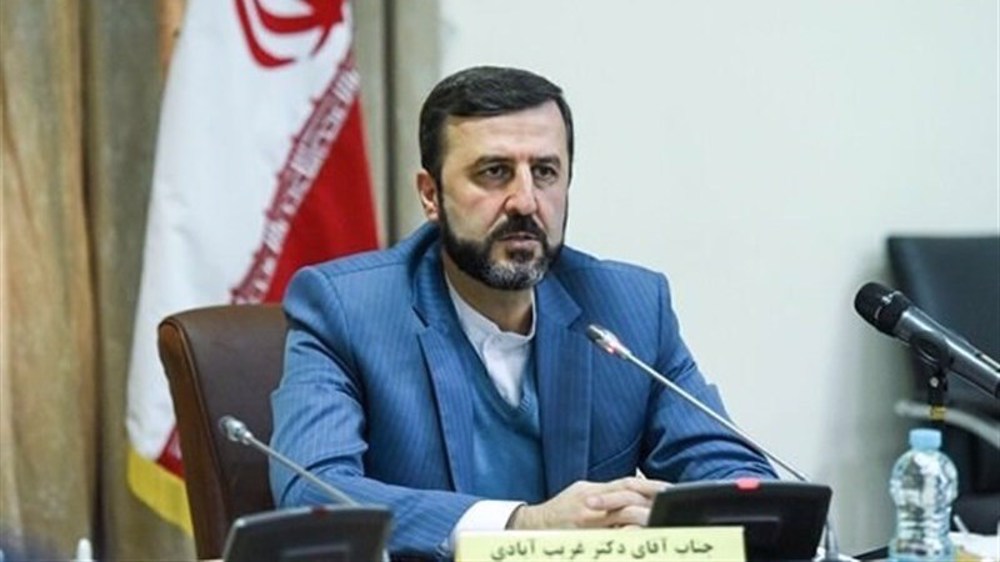IAEA chief attends press conference in Vienna, goes back on previous remarks on Iran agreement
The director general of the International Atomic Energy Agency (IAEA) has apparently gone back on his previous remarks about reaching a good agreement with Iran on the settlement of outstanding issues following his recent visit to Tehran.
Speaking during a press conference following the Monday session of the IAEA’s Board of Governors in Vienna, Rafael Mariano Grossi pointed to three major issues regarding Iran’s nuclear program, including the Fordow nuclear facility, evaluation of data obtained from monitoring equipment, and implementation of the Safeguards Agreement.
The press conference took place two days after Grossi visited Iran and held meetings with head of the Atomic Energy Organization of Iran (AEOI) Mohammad Eslami, President Ebrahim Raeisi and Foreign Minister Hossein Amir-Abdollahian, to discuss the country’s peaceful nuclear program.
At the end of the two-day visit, Grossi and Eslami issued a joint statement in which the two sides agreed to take steps aimed at facilitating enhanced cooperation and expediting the resolution of outstanding safeguards issues.
Both sides also agreed that bilateral interaction will be carried out in a spirit of collaboration, and in full conformity with the competencies of the IAEA and the rights and obligations of Iran based on the comprehensive Safeguards Agreement.
Moreover, Iran expressed in the statement its readiness to "allow the IAEA to implement further appropriate verification and monitoring activities" on a voluntary basis.
“During the technical trip that preceded my visit, there were a number of things that were agreed but they needed some consolidation and confirmation,” Grossi said in the Monday presser.
Pointing to Iran’s provision of access to sites, people of interest and places for the implementation of the safeguards, Grossi said, "We are discussing all these things with Iran. It is correct we did not put things on paper. We are discussing.”
His remarks, according to analysts, contradicted what he had already said in the Saturday statement.
Also on the subject of the agreement with Iran to re-install all extra monitoring equipment, such as surveillance cameras that were removed last year as the deal unraveled following the US withdrawal from the JCPOA in 2018, he said, "We will have to discuss...this, how do we do it."
Grossi, thus, conceded that this and other issues would largely hinge on future technical talks and were far from finite.
Grossi had on Saturday given a clear "yes" when asked whether Iran would re-install all the cameras and equipment it had removed last June.
On Saturday, @rafaelmgrossi gave a clear "yes" when asked whether Iran would re-install all the cameras & equipment it removed last June. This time, he said "in general, terms yes," Iran will replace the equipment but that depend on "certain modalities..." -3-
— laurence norman (@laurnorman) March 6, 2023
The director general of the IAEA also claimed there was no agreement at this point on Iran handing over previous footage and data taken by cameras and other equipment at the nuclear-related sites, saying, "There are certain things we need to clarify.”
Behrouz Kamalvandi, the spokesman for the AEOI, also rejected on Sunday allegations that Iran had agreed to give the agency access to certain people of interest, saying, “During the two days that Mr. Grossi and his accompanying delegation were in Iran, no discussion was made of access to people and no text has been drawn up on this issue.”
"We cannot give you at this stage full lists of dates, places, people, @rafaelmgrossi says. "It would be impossible." A visibly irritated Grossi says to @francoismurphy clear, precise questioning -- "Why don’t you let us do our job?" -6-
— laurence norman (@laurnorman) March 6, 2023
On the safeguards probes, Grossi was unable to substantiate his statement on Saturday that the Agency would get access to information, people and places for his inspectors from Iran, saying, "I sense that there is an understanding" to give agency broad access.
Grossi could not confirm that Iran had committed itself to allow the agency's access to a list of specific places and people.
"We cannot give you at this stage full lists of dates, places, people. It would be impossible," said a visibly irritated Grossi on Monday, when asked by a reporter for clarity on the safeguards implementation. “Why don’t you let us do our job?” he asked angrily.
Grossi does not confirm Iran committed access to a list of specific places and people. Says investigative process will evolve.
— Henry Rome (@hrome2) March 6, 2023
Asks “Why don’t you let us do our job?” And maybe @francoismurphy got a job offer out of it.
Asked about Iran’s firm commitment to the evaluation of monitoring equipment data in its possession under the 2015 nuclear agreement, known as the Joint Comprehensive Plan of Action (JCPOA), Grossi said, “I would say in general terms ‘Yes’,,, but there are certain modalities that need to be agreed upon.”
His remark came in contrast to his earlier comments in which he had underscored the Islamic Republic’s strict observance of the JCPOA-related obligations.
Iran and the IAEA are currently in a dispute triggered by the agency’s Israeli-influenced accusations against Tehran’s peaceful nuclear activities. The IAEA insists to probe into what the agency claims are “uranium traces” found at “undeclared nuclear sites” in Iran.
The issue has emerged as a key sticking point in talks aimed at salvaging the JCPOA, which remain stalled since last August. Iran has dismissed the probe as “politically motivated.”
VIDEO | Israel silencing truth
IRGC: Enemy command room of 10 intel agencies targeted Iran
US threat to Iran's Leader will ignite entire region: Hezbollah
VIDEO | Campaign to stop sale of Israel bonds grows in US
VIDEO | Iran judiciary, military detail foreign role in unrest; honor martyrs
Experts slam ‘scientifically reckless’ US withdrawal from WHO
Recent US military actions signal return to ‘predatory colonialism’: UN rapporteur
‘Confused clowns’: Iran FM blasts Zelensky over call for aggression on Iran











 This makes it easy to access the Press TV website
This makes it easy to access the Press TV website